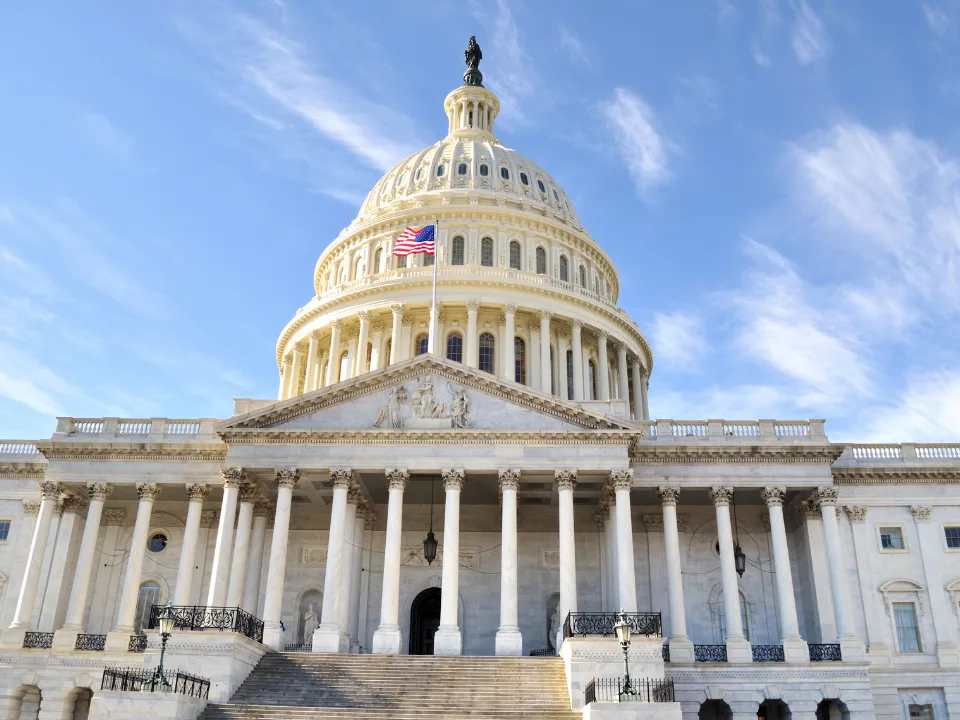Oversupply Risk Looms as Multifamily Deliveries Reach Near-Record High
CBRE forecasts that the delivery of 716,000 new multifamily housing units over the next two years will push the sector’s overall vacancy rate above equilibrium by year-end.
Good morning. Three more days until clocks “spring” forward to mark the return of daylight, which means longer days to pencil out more deals.
In today’s email:
-
Multifamily: Oversupply is expected to be quickly absorbed.
-
Texas: Office market in major cities returns to earth.
-
The Fed: Bigger rate hikes hinted, early thaw unlikely.
-
Chart: Dodge Momentum Index gets a boost in February.
TOO MUCH OF A GOOD THING?
Record Multifamily Delivery Could Lead to Oversupply if Not Absorbed
The multifamily sector can expect a near-term oversupply as 716K new U.S. multifamily housing units are slated for delivery over the next two years. While dramatic, according to research from CBRE, this development is necessary to keep the sector healthy in the long term.

CBRE
Multifamily madness: Such an oversupply is anticipated to move the vacancy rate of the multifamily sector up to a peak of 4.6–5.2% by the end of 2023, a stark contrast to the present single-family housing shortage. In the meantime, CBRE believes rental housing demand will grow this year as vacancy rates finally jump above their 5% average.
Absorption aspirations: The buck doesn’t stop there, however, as CBRE thinks even more units are needed to maintain healthy fundamentals for the next 10 years. Once most upcoming multifamily deliveries are completed in 2024, the U.S. will still need an additional 200K units annually to maintain balance. Notably, huge increases in construction costs and ongoing supply chain snarls have caused multifamily starts to slow down, even in all-star markets like Austin and Atlanta.
Rise in rents: Even though the multifamily sector has reported negative net absorption over the past 3 quarters, demand could turn positive for the first half of the year. If this happens, the rate at which vacancies slow down growth could be limited, and CBRE expects rents to rise 3.5% for the year. While that’s still down from 2022’s 6.7% rent growth, it’s very healthy compared to the long-run average of 2.5%.
➥ THE TAKEAWAY
Zoom out: CBRE warns that labor shortages could delay construction, slowing unit availability growth by increasing construction timelines by 25%. Although there will still be a need for 200,000 more units a year to maintain supply and demand balance, the distribution of building may change due to slowing movement patterns, and Federal Reserve decisions on monetary policy could also interrupt building plans.
LONE STAR LAMENT
After Major Office Boom, Major Texas Metros Feel The Burn
The chill wind blowing through the office markets of major metros like LA and NYC has begun drifting South. And even though Texas has been leading the back-to-office movement, its biggest cities have also been affected.
A rising star: Early last year, Austin sat atop the office market, growing into its own as an office hotspot as demand, rents, and construction numbers all looked amazing. According to CBRE, in April 2022, asking rents were as high as $53 per SF, the first time rates passed $50 per SF since being recorded in 1989.
Brightly burning comet: Average rents in Austin and Dallas were up YoY in Q4. Austin saw a 1.47% increase while Dallas jumped 3.47%. At the time, CBRE disclosed that their office construction pipeline was the biggest in the country as a proportion of existing stock. In fact, Austin and Dallas projects under construction in Q1 2022 constituted 9.4% of existing inventory for the period.
Falling to earth: Since then, net absorption has plunged into the red for Dallas and Austin. In Dallas, the drop since Q4 2021 has hit nearly -130% at -266 KSF. Austin’s numbers were even worse at -208%. Houston’s net absorption improved by 34%, but that doesn’t mean much when you’re looking at -647 KSF. Vacancy rates went down in Houston and Dallas but shot up 2% in Austin. Overall, the vacancy rate in all three Texas metros remains above 20%.
➥ THE TAKEAWAY
It was fun while it lasted: Austin’s office boom was fueled by a mass exodus of tech companies fleeing the high cost of the Bay Area, in particular. Now that those very same firms are slashing costs in the face of a possible economic downturn (or outright leaving, like Tesla), Austin is feeling the squeeze more than its neighbors.
🌐 AROUND THE WEB
📖 Read about how investment managers are targeting opportunistic deals different from the distressed real estate plays of 2020.
🖥️ Watch as members of Congress confront Powell and critically analyze the Fed’s controversial strategy to continue combating inflation.
🎧Listen to Ben Miller, the CEO of Fundrise, detail opportunities he sees in debt on this episode of the Deconstuct Podcast from The Real Deal.
FATE OF THE RATE
Market Reacts to Powell’s Signal of Faster-than-Expected Interest Rate Hikes
Make sure to check your optimism as it appears that interest rates are heading back up at an even faster rate and in bigger hikes than anticipated, according to everyone’s favorite Fed Chairman, Jerome Powell. Here’s what it means for real estate investors.
What positive outlook? In recent comments, Powell seemed open to the possibility of a 0.5% increase in the federal funds rate by the end of the month. A hike of this size would essentially be double what was expected and could broadly impact the economy, driving up the cost of borrowing for homebuyers and CRE investors even more.
Looking to the past: The average 30-year fixed rate mortgage rate was 6.65% last week, according to Freddie Mac. Although Brown Harris Stevens’ chief economist says the public shouldn’t worry about a 7% mortgage rate, he does think 8% would be worrisome (as if that’s somehow encouraging). He was also careful to note that today’s rates resemble those at the peak of the 2007 housing bubble.
“The Fed is killing us”: Big real estate players, like Berkshire Hathaway Home Services, have been hoping that mortgage rates would stay at 6% or lower going into the spring season, but that doesn’t seem to be happening. Berkshire Hathaway Home Services CEO Steven James believes more rate hikes will hit first-time buyers the hardest since they simply can’t compete with all-cash buyers.
➥ THE TAKEAWAY
Belt-tightening ahead: If Powell is as good as his word, subsequent rate hikes could have a ripple effect throughout the markets. Higher borrowing costs will lead to even less attractive home prices, resulting in lower transaction volumes and hurting everyone in real estate. Sellers and agents will also be forced to work with a smaller pool of picky buyers and renters as rents keep slipping nationwide.
✍️ Daily Picks
-
Right on time: According to a report from Chandan Economics, Colorado and Washington have the highest number of tenants who pay small landlords on time.
-
Running up that hill: While 2022 was a difficult year for real estate investors, confidence is gradually returning to the markets in some regions, like Asia-Pacific.
-
Domicile drought: According to Realtor.com, the gap between single-family projects and household formations grew to 6.5 million homes in the 10 years between 2012–2022.
-
A new perspective: In the wake of the pandemic, the practice of using discounted cash flow (DCF) as a form of valuation has been picking up steam.
-
Turning off the lights: During the pandemic’s e-commerce boom, Amazon (AMZN) overexpanded, topping out at 400 MSF. Now they’re shutting down 99 logistics facilities in 30 states.
-
The Cybertruck killer: EV manufacturer and Volkswagen ally Scout Motors have announced plans to open a 1600-acre, $2B electric truck and SUV plant outside of Columbia, SC.
-
Data center drama: After a steady decline in the cost of data center space, average monthly rates shot up in 2022 thanks to the rising cost of energy and ongoing supply chain issues.
-
Say goodbye: Two of the nation’s biggest mortgage lenders, Rocket Companies (RKT) and United Mortgage, cut nearly 10K roles from their rosters.
-
Disturbance in the deficit: The US trade deficit grew to $68.3B, its widest margin in a three month period, fueled by persistent domestic demand for imports.
-
Taking potshots: NY representative Nydia Velázquez introduced legislation that would fine property owners $100K every month they ‘deliberately’ leave an apartment empty.
-
House hunting: As builders grapple with high construction costs and rising interest rates, homebuyers could be offered incentives like mortgage buydowns or free upgrades and options.
-
Dark day for debt: The current office market has left the debt securities market on the back foot. Mortgage-backed securities delinquent on debt also jumped to 32.1% in February.
-
Taking a tumble: Once a paragon of reliability, Class A office assets are becoming far less appealing. The situation is similar (if not worse) for Class B and C properties.
💼 Talent Collective
In partnership with Bullpen
Bullpen’s new contract roles this week include a particularly fascinating development position with hospitality real estate in Texas. Join today for access to the below roles, as well as several other freelance openings.
-
Development Manager, Hospitality
💰 Full-time or part-time (Remote) ❗️ Focus on a ground-up project in Texas
-
Development Associate, Multifamily
💰 Hourly (Remote) 📍 Emphasis on Miami-area multifamily
-
Marketing Specialist
💰 Hourly (Remote) 📍 Emphasis on markets in the Southeast
Looking to hire? Connect with Bullpen
🤝 Deals & Dealmakers
-
Treading water: Cushman & Wakefield (CWK) has listed a 77-acre canal in Venture County, CA for $1M. The catch? It smells terrible.
-
Southern hospitality: BlackPearl Hospitality purchased a 291-key DoubleTree by Hilton property in Tampa, FL for $76M (or $261K per key).
-
The wheels of industry: Protective Life, Old National Bank, and One America are giving Burton-Katzman and RA Advisors $150M to acquire 24 Midwestern industrial properties.
-
Stocking up on storage: Miami-based self-storage firm Basis Industrial has paid $30M for a 60 KSF warehouse and adjacent business site in Westchester County.
-
Downsizing deals: In a move to downsize their office space, logistics firm Ryder System sold its corporate HQ in Miami-Dade County for $42.1M to Bridge Industrial.
-
Southern serendipity: Serendipity Labs has opened a 26 KSF coworking space in the Charleston, SC suburb of Summerville. The property is owned by Vulcan Property Group.
-
Sitting pretty in Windy City: Ashkenazy Acquisition Corp. purchased the 200 KSF Gateway Center Plaza from Stockbridge Captial Group in the Uptown submarket.
-
Part of the family, eh? Canada-based Cadillac Fairview scooped up Lincoln Property Company’s residential division, one of the most active apartment developers in Dallas.
-
Scraping the sky: Loukas Development proposed a 530-foot apartment building in Chicago’s Fulton Market, the country’s fastest-growing office market.
-
Mixed-use moves: A JV between Darryl Shaw and KETTLER has broken ground on 50-acre mixed-used development Gas Worx in Tampa, FL.
📈 Chart of the Day
The Dodge Momentum Index (DMI) ended February at 203, up 1.9% from a January reading of 199.3. If the trend continues, construction activity could improve in 2024.
🎁 Tell Friends → Get Merch
Share the CRE Daily with colleagues and friends, and when they sign up, you’ll earn exclusive content and free swag.
Or copy this custom referral link: https://newsletter.credaily.com/subscribe?ref=PLACEHOLDER

You currently have 0 referrals, only 3 away from receiving your next milestone: Back of the Napkin Multifamily Deal Screener.
What did you think of today’s newsletter? |




















